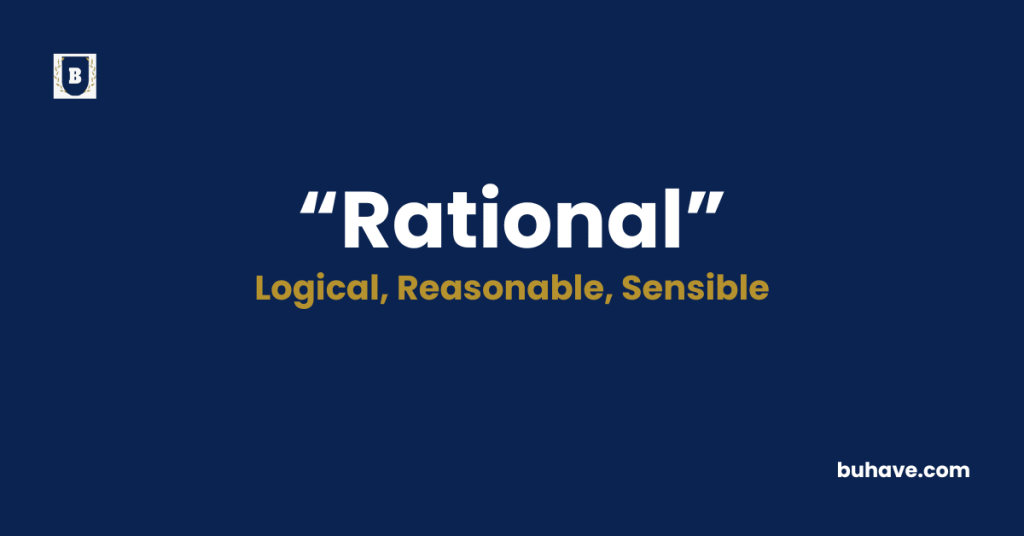The word ‘Rational’ (Adjective) refers to thoughts, decisions, or actions that are based on reason, logic, or clear thinking rather than emotions or impulses. In this guide, you’ll explore the full meaning, definition, etymology, examples, synonyms, antonyms, and FAQs about “Rational” and how it’s used in real-life communication and contexts.
Rational Explained in Depth
A complete and detailed guide to the words Rational including meaning, definition, examples, etymology, synonyms, and antonyms.
Meanings of Rational
Rational describes something or someone that relies on logic, reason, or sound judgment. When a person is rational, they tend to think things through carefully, consider evidence, and make decisions based on facts rather than emotions. Being rational often involves weighing pros and cons, avoiding snap judgments, and aiming for fairness or objectivity.
This word is commonly used to describe people’s behavior decisions arguments or even plans and systems. Rationality is considered a key trait in science, mathematics, business, leadership, and conflict resolution essentially any area where thoughtful, reasonable action is needed.
Definition
Rational making decisions or thinking in a way that is based on logic, reason, and clear thinking rather than emotions or impulses. When someone is being rational, they take time to consider facts, weigh options, and then choose what makes the most sense.
For instance, instead of reacting emotionally to a problem, a rational person would pause, think things through, and respond with a calm and thoughtful solution. In other words, being rational involves using your mind to make wise, well-thought-out choices, especially when things feel uncertain or stressful.
Etymology
The word “Rational” originates from the Latin word rationalis, which means “reasonable” or “endowed with reason.” This comes from ratio, meaning “reason, calculation, or method.” The root word ratio was often used in classical Latin to describe the act of thinking, reasoning, or measuring logically. Over time, the term entered Old French as rationel and later Middle English as rational during the 14th century.
In philosophy, “rational” became especially important during the Age of Enlightenment, when reason and critical thinking were championed as the foundation of knowledge and progress. Philosophers like Descartes and Kant emphasized rational thought as the core of morality, logic, and science. Today, the word maintains this association with intelligence, reason, and clear thinking across fields like ethics, law, economics, and education.
Example Sentences
- It’s important to stay rational when discussing emotional topics.
- Her rational approach to problem-solving helped the team succeed.
- Even in crisis, he remained calm and made rational decisions.
- Their plan seemed rational and well thought-out.
- A rational explanation helped clear up the misunderstanding.
Rational Synonyms
- Logical
- Reasonable
- Level-headed
- Sound
- Judicious
- Coherent
- Analytical
- Clear-headed
- Pragmatic
- Thoughtful
Rational Antonyms
- Irrational
- Emotional
- Illogical
- Unreasonable
- Impulsive
- Unthinking
- Unbalanced
- Wild
- Instinctive
FAQs about Rational
Here are some frequently asked questions (FAQs) about the word “Rational”
1. What does it mean to be a rational person?
A rational person uses logic and reason to make decisions or form opinions. They rely on facts, analysis, and careful thought rather than reacting purely on emotion or instinct.
2. Can rational and emotional coexist?
Yes. Rational thinking doesn’t eliminate emotions—it simply means that emotions are not the primary guide for decisions. Emotionally intelligent people balance both aspects effectively.
3. Is being rational the same as being cold or unfeeling?
No. Being rational doesn’t mean lacking emotions—it means not allowing emotions to control your choices. A rational person can still be compassionate and empathetic.
4. What’s the difference between rational and logical?
They are closely related, but “logical” refers more specifically to following strict rules of logic, while “rational” includes the broader use of reason, judgment, and common sense.
5. Can you be rational in everyday life?
Absolutely. Rational thinking helps with budgeting, resolving conflicts, planning, setting goals, and more. It’s a skill that improves decision-making in daily situations.

















